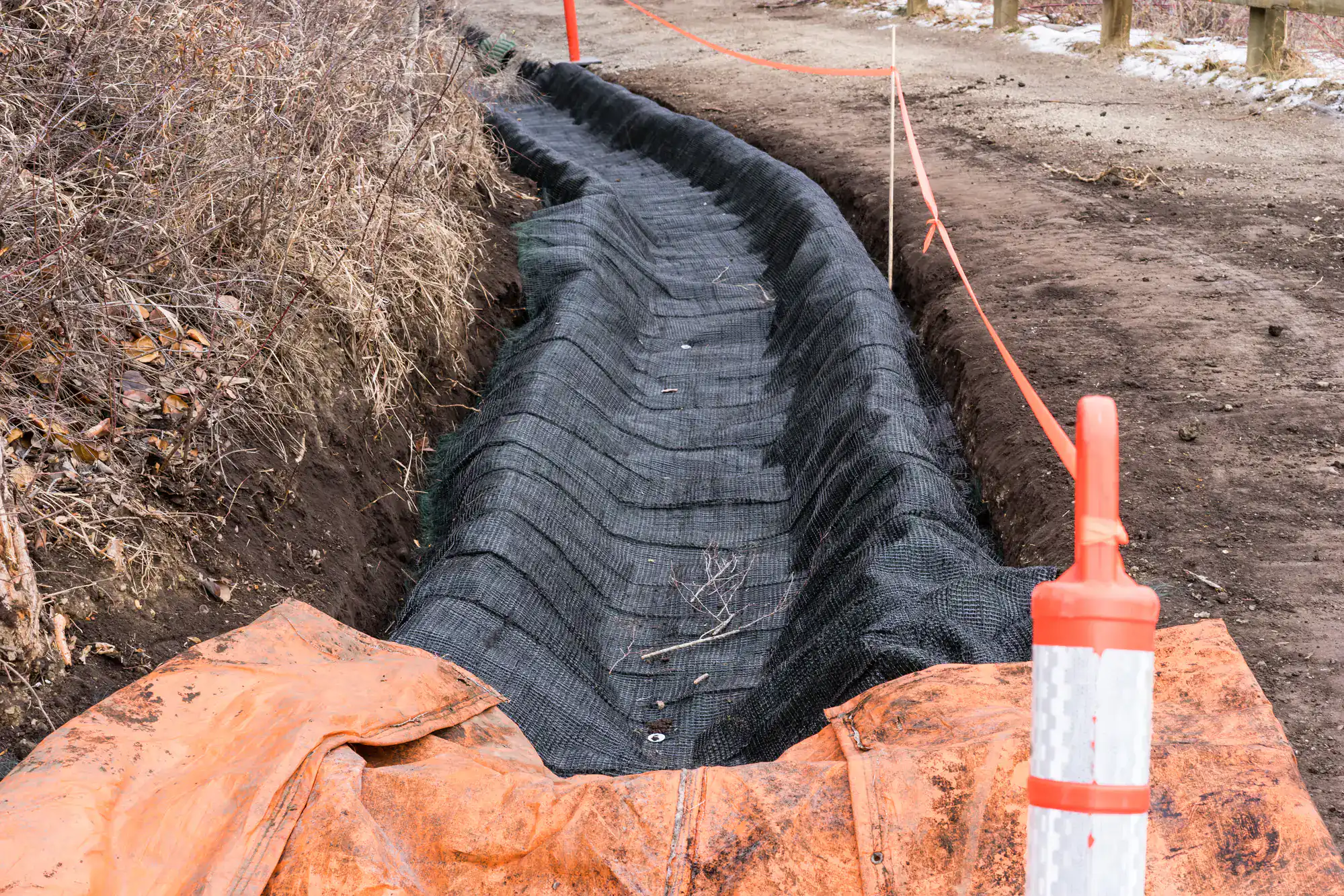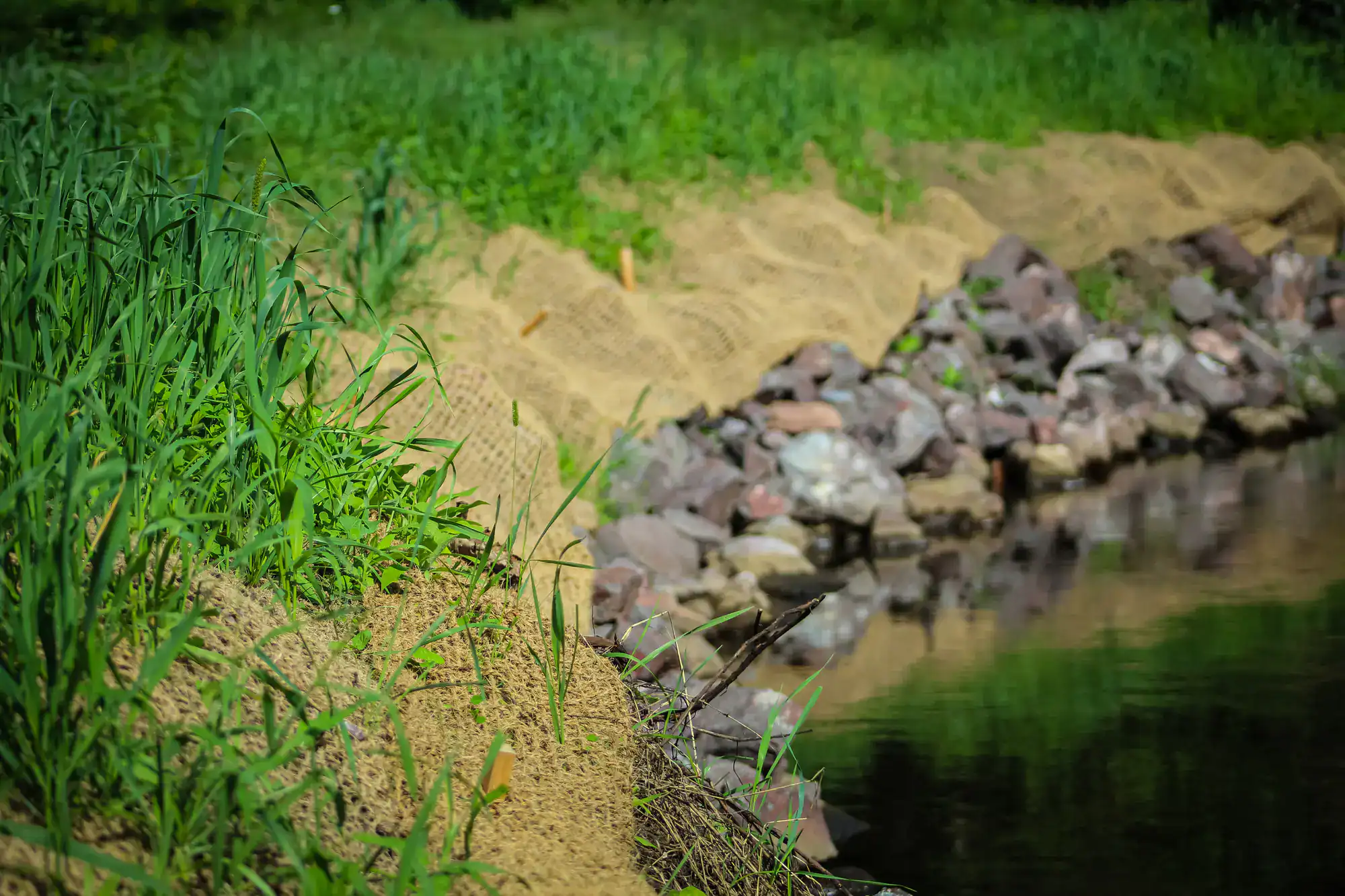Erosion Control in Richmond, VA
Protect Your Property Investment From Soil Loss


Richmond Soil Stabilization Services
When erosion threatens your Richmond property, you’re not just losing soil—you’re watching your investment wash away. Construction sites without proper erosion control face fines up to $1,000 per violation, plus the real cost of lost topsoil and project delays.
With effective erosion control, your land maintains its stability and value. Your construction stays on schedule. Your soil stays where it belongs, supporting healthy vegetation and protecting nearby waterways from sediment damage.
The difference is immediate: no more bare spots appearing where grass once grew, no more exposed tree roots popping up after storms, and no more worry about compliance inspectors shutting down your project.
Richmond Erosion Control Company
We’ve been protecting Richmond-area properties from erosion for over two decades. As a locally-owned excavation and erosion control company, we understand the unique soil conditions and regulatory requirements that Richmond developers and property owners face.
Our reputation in the Northern Neck and Middle Peninsula regions comes from doing what we say we’ll do. When we commit to an erosion control project, you get regular updates, quality work, and results that last.
Richmond’s diverse landscape—from the James River waterfront to the rolling hills surrounding the metro area—requires contractors who understand local soil types, drainage patterns, and the environmental challenges that come with Virginia’s climate.

Erosion Control Process Richmond
Every effective erosion control project starts with understanding your specific site conditions. We evaluate your soil type, slope, drainage patterns, and project timeline to design the right combination of controls for your Richmond property.
Installation comes next. Whether you need silt fencing, sediment basins, or comprehensive soil stabilization, we use state-of-the-art equipment to install controls quickly and correctly. Proper installation means trenching silt fence below ground level, positioning sediment traps at optimal locations, and ensuring all controls work together as a system.
Throughout your project, we monitor and maintain the controls. Virginia weather can be unpredictable, and erosion controls need regular inspection and maintenance to stay effective. We handle the ongoing care so your project stays compliant and your land stays protected until final stabilization.

Ready to get started?
Richmond Silt Fencing Solutions
Our erosion control services cover everything Richmond contractors and developers need to meet Virginia’s strict environmental regulations. From silt fencing and geo-textiles to riprap installation and culvert work, we provide the full range of solutions required for construction site compliance.
Richmond’s position in central Virginia means dealing with both Piedmont clay soils and coastal plain sandy soils, depending on your project location. Each soil type requires different erosion control approaches. Clay soils need controls that handle sheet flow and prevent gully formation, while sandy soils require techniques that address wind erosion and rapid water infiltration.
The new Virginia Erosion and Stormwater Management regulations that took effect in 2024 have consolidated previous requirements, but they’ve also increased the complexity of compliance. We stay current with these regulatory changes, ensuring your Richmond project meets all current standards without delays or complications.

What erosion control permits do I need for construction in Richmond, VA?
Any land-disturbing activity in Richmond exceeding 2,500 square feet requires an approved erosion and sediment control plan before work begins. For projects disturbing one acre or more, you’ll also need coverage under Virginia’s Construction General Permit.
The permit process involves submitting detailed plans showing how you’ll prevent soil erosion and keep sediment on your site. Richmond County reviews these plans and issues permits only after confirming your erosion controls meet Virginia’s minimum standards. Starting work without approved plans carries automatic $1,000 fines, plus additional penalties for each day of violation.
We handle the technical aspects of plan preparation and can recommend the most cost-effective combination of controls for your specific site conditions.
How much does silt fencing installation cost in Richmond?
Silt fencing costs vary based on site conditions, fence height, soil type, and total linear footage needed. Rocky or heavily rooted soil increases installation time, while sites with easy access and good soil conditions install more quickly.
The key factor isn’t just installation cost—it’s getting silt fence installed correctly the first time. Improperly installed silt fence fails during the first significant rainfall, requiring expensive reinstallation and potential regulatory violations. Proper installation requires trenching the fabric 4-6 inches below ground level and using adequate post spacing for your site’s slope and drainage conditions.
We provide detailed estimates based on site visits, not generic per-foot pricing, because effective erosion control requires understanding your specific site challenges.
When should erosion controls be installed during construction?
Erosion controls must be installed before any land disturbance begins—this is both a regulatory requirement and practical necessity. Virginia law requires controls to be in place prior to clearing, grading, or excavation activities.
The most effective approach installs perimeter controls like silt fencing first, then adds additional controls as work progresses. Sediment basins and traps should be functional before major grading begins. Temporary seeding or mulching gets applied to any area that will remain undisturbed for more than 30 days.
Trying to install erosion controls after land disturbance has already begun means working in unstable, muddy conditions that make proper installation difficult and expensive. It also means potential violations and fines for the period between disturbance and control installation.
How often do erosion controls need maintenance in Richmond?
Virginia regulations require erosion control inspection within 48 hours of each rainfall event, with immediate repairs as needed. Richmond’s climate means frequent inspections during spring and summer storm seasons.
Silt fence typically needs sediment removal when accumulated material reaches one-third of the fence height. Sediment basins require cleanout when storage capacity drops below design levels. Storm damage, equipment impacts, or normal wear can require repairs between scheduled maintenance visits.
We offer regular maintenance contracts that keep your controls functioning properly throughout your project duration. This proactive approach prevents small issues from becoming expensive problems and keeps your project in continuous compliance with Virginia regulations.
What happens if my erosion controls fail during construction?
Failed erosion controls create both environmental and legal problems. Sediment leaving your site can damage downstream properties, clog storm drains, and harm local waterways. Virginia regulators can issue stop-work orders until controls are repaired and violations are resolved.
The immediate response involves stopping work in affected areas, containing any sediment that has left the site, and repairing or replacing failed controls. Documentation of the failure, response actions, and corrective measures may be required for regulatory reporting.
Prevention is far more cost-effective than cleanup. Properly designed and installed controls, with regular maintenance, rarely fail completely. When we install erosion controls, we design them for Richmond’s specific soil and weather conditions, not generic specifications that may not work in local conditions.
Can erosion control work continue during winter in Richmond?
Most erosion control installation can continue through Richmond’s mild winter months, though frozen ground conditions may limit some activities. Winter actually offers advantages for certain types of work, with lower rainfall and reduced vegetation growth making site access easier.
Silt fence installation works well in winter conditions, and sediment basin construction can proceed unless ground frost prevents excavation. Seeding and vegetation establishment typically wait for appropriate growing seasons, but temporary mulching and erosion control blankets provide effective interim protection.
Winter installation allows controls to be in place and tested before spring’s heavier rainfall season. This timing helps identify any needed adjustments before weather conditions become more challenging for both installation and maintenance activities.
